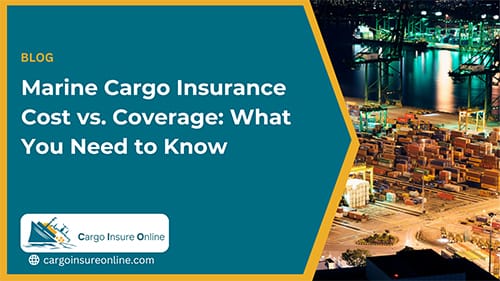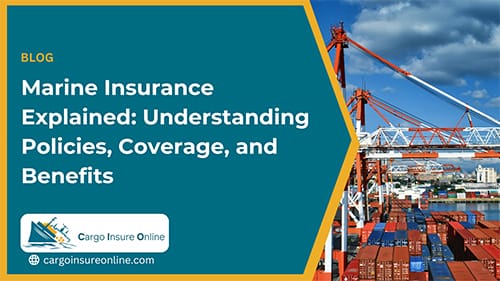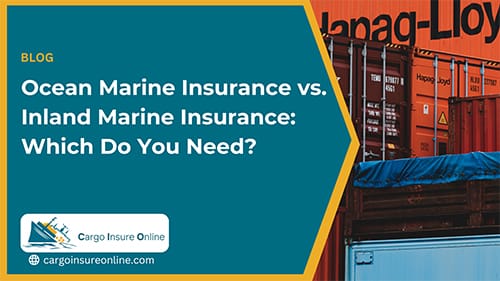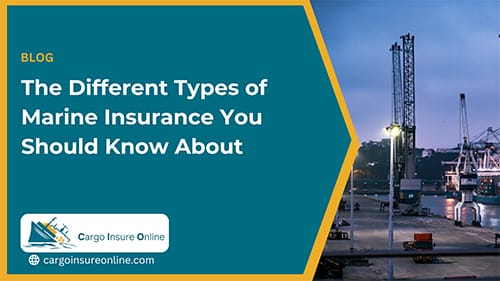Marine Cargo Insurance Cost vs. Coverage: What You Need to Know
When it comes to shipping goods internationally, understanding marine cargo insurance is essential for protecting your shipments. However, with various policies available, it’s crucial to understand the balance between the cost of marine cargo insurance and the level of coverage you receive. This guide will walk you through the factors that influence the cost of marine cargo insurance and how to ensure you’re getting the best value for your money. What Affects the Cost of Marine Cargo Insurance? Several factors contribute to the overall cost of marine cargo insurance. While it may seem like a straightforward process, understanding what influences the price of your policy can help you make informed decisions when choosing coverage. Value of Goods The value of the goods being shipped plays a significant role in determining the cost of marine cargo insurance. Higher-value items will generally require more coverage, leading to a higher premium. Shipping high-value goods such as electronics, machinery, or luxury items requires more extensive protection. Shipping Route and Distance The route and distance your goods travel also impact the cost. Long-distance shipments, especially those that cross high-risk areas or are subject to unpredictable weather conditions, will likely incur higher premiums due to the increased risk of damage, loss, or theft. Type of Coverage The level of coverage you select will significantly affect your premium. All-risk policies typically cost more than named perils policies because they provide more comprehensive protection. Deductibles and Excess The deductible (or excess) amount you choose can affect your insurance premium. Opting for a higher deductible can lower your premium, but it means you’ll be responsible for a larger amount in the event of a claim. Weighing the trade-off between premium cost and deductible amount is crucial when selecting the right policy. Types of Coverage and Their Impact on Cost The type of marine cargo insurance coverage you select directly affects your premium. Each type of coverage offers different levels of protection for your shipments. All-Risk Insurance All-risk marine cargo insurance is the most comprehensive type of coverage, protecting against a wide range of risks, including damage, theft, and natural disasters. Since it provides broad protection, the premium for all-risk insurance is typically higher than other policies. Named Perils Insurance Named perils insurance covers only specific risks explicitly listed in the policy, such as theft, fire, or storm damage. Because it covers fewer risks, it tends to be more affordable than all-risk policies. However, it leaves you exposed to other potential risks that may not be covered. Open Cargo Insurance Open cargo insurance provides coverage for all shipments over a set period, regardless of the shipment details. This policy can be cost-effective for businesses that ship regularly, as it offers consistent coverage at a lower cost than purchasing individual policies for each shipment. How to Balance Cost and Coverage for Your Business Finding the right balance between cost and coverage is essential when selecting marine cargo insurance. Here are some tips to ensure you get the best value while protecting your shipments adequately. Assess Your Risk Consider the risks associated with your shipments. If you’re shipping high-value or fragile goods, it may be worth investing in more comprehensive coverage, even if it means a higher premium. On the other hand, if your shipments are low-risk or lower value, a named perils policy may be sufficient. Shop Around for Quotes Different insurance providers offer various rates and coverage options. Be sure to compare quotes from different insurers to find the best policy for your needs. You might find that a higher-quality provider offers more value in the long run, even with a slightly higher premium. Review Your Policy Regularly As your business grows, your shipping needs may change. Regularly reviewing your marine cargo insurance policy ensures that your coverage is up-to-date with the current value of your goods and the shipping methods you’re using. Conlcusion Marine cargo insurance is a necessary expense for businesses involved in global shipping, but understanding the relationship between cost and coverage is vital for selecting the right policy. By evaluating the value of your goods, shipping routes, and coverage needs, you can find the most cost-effective solution that provides the necessary protection for your shipments. Get started today by visiting our Homepage or contacting us via our About Us page to find the best marine cargo insurance coverage for your shipments. Get an instant quote from Cargo Insure Online and protect your cargo worldwide. Protect Your Cargo Now Suggested Related Blogs from CIO: What is Cargo Insurance, and Why Is It Crucial for Your Business? Protecting Your International Shipments: Why Exporters and Importers Need Cargo Insurance Why International Cargo Insurance is a Comprehensive Protection for Global Shipments Resources You Might Be Interested In: International Chamber of Shipping – Shipping Insurance and Liability Marine Insurance – Allianz Global Corporate & Specialty Cargo Insurance Insights – The Transporter’s Guide



















